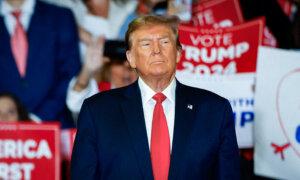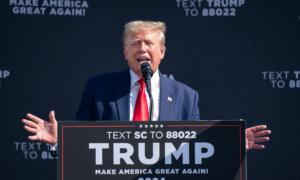Supreme Court’s decision could determine whether the Republican presidential primary frontrunner stands trial in the case before the November election.
Former President Donald Trump, in his Monday emergency petition to the Supreme Court, made an additional request that could add another delay to his federal election case trial.
While petitioning the high court to extend the delay in his federal election interference trial, President Trump’s lawyers indicated their intention to further prolong the delay by also requesting that the full District of Columbia Circuit Court of Appeals weigh in. Only after that process would they file a formal appeal to the Supreme Court, they wrote. This could delay the restart of trial preparations by weeks if not months.
The move comes after a three-judge panel on the District of Columbia’s Court of Appeals rejected President Trump’s arguments that he is immune from prosecution because the actions that he took after the 2020 election were in his official capacity as president.
If his request succeeds, it means that President Trump’s election-related trial will be pushed back even further. The D.C. Appeals Court judge overseeing that case, Tanya Chutkan, placed the case on hold in early December, and she wrote earlier this month that the initial March 4 trial date would be pushed back indefinitely.
The Supreme Court’s decision on what to do, and how quickly it acts, could determine whether the Republican presidential primary frontrunner stands trial in the case before the November election.
There is no timetable for the court to act, but the special counsel team has strongly pushed for the trial to take place this year. President Trump, meanwhile, has repeatedly sought to delay the case. If the former president were to defeat President Joe Biden, he could potentially try to use his position as head of the executive branch to order a new attorney general to dismiss the federal cases he faces or even seek a pardon for himself.
The Supreme Court’s options include rejecting the emergency appeal, which would enable Judge Chutkan to restart the trial proceedings in Washington’s federal court.
The court also could extend the delay while it hears arguments on the immunity issue. In that event, the schedule the justices set could determine how soon a trial might begin if indeed they agree with lower court rulings that Trump is not immune from prosecution.
Monday’s filing with the Supreme Court primarily sought to ask the justices to place the D.C. Appeals Court ruling on hold because that court carried out an “unprecedented and unacceptable departure from ordinary appellate procedures and allow President Trump’s claim of immunity to be decided in the ordinary course of justice.”
His lawyers signaled they want the Supreme Court to hear his immunity case and overturn the lower court decision, but the nine justices have to first decide whether the lower court ruling should be placed on hold.
“President Trump’s claim that presidents have absolute immunity from criminal prosecution for their official acts presents a novel, complex, and momentous question that warrants careful consideration on appeal,” they added.
The Supreme Court on Tuesday gave the special counsel involved in the federal cases against Donald Trump one week to respond to the former president’s request to allow his election trial to remain on hold as he appeals claims over presidential immunity. In a brief order issued by Chief Justice John Roberts, it said Special Counsel Jack Smith has until next Tuesday at 5 p.m. ET to address the emergency petition that President Trump’s lawyers filed on Monday.
Prosecutors under Mr. Smith already urged the Supreme Court to resolve the immunity dispute quickly so that the D.C. trial can remain on schedule. In December, after asking the high court to take up the issue, the justices denied the attempt and returned it to the D.C. Circuit Court of Appeals.
“It is of imperative public importance that respondent’s claim of immunity be resolved by this court and that respondent’s trial proceed as promptly as possible if his claim of immunity is rejected,” the prosecutors wrote in December.
The Supreme Court has previously held that presidents are immune from civil liability for official acts. President Trump’s lawyers have for months argued that that protection should be extended to criminal prosecution as well.
Other than the Washington case, President Trump also faces charges in Georgia, New York, and Florida. He has pleaded not guilty, accusing prosecutors of weaponizing the Justice Department to harm his political chances.
The Associated Press contributed to this report.
Original News Source Link – Epoch Times
Running For Office? Conservative Campaign Consulting – Election Day Strategies!


